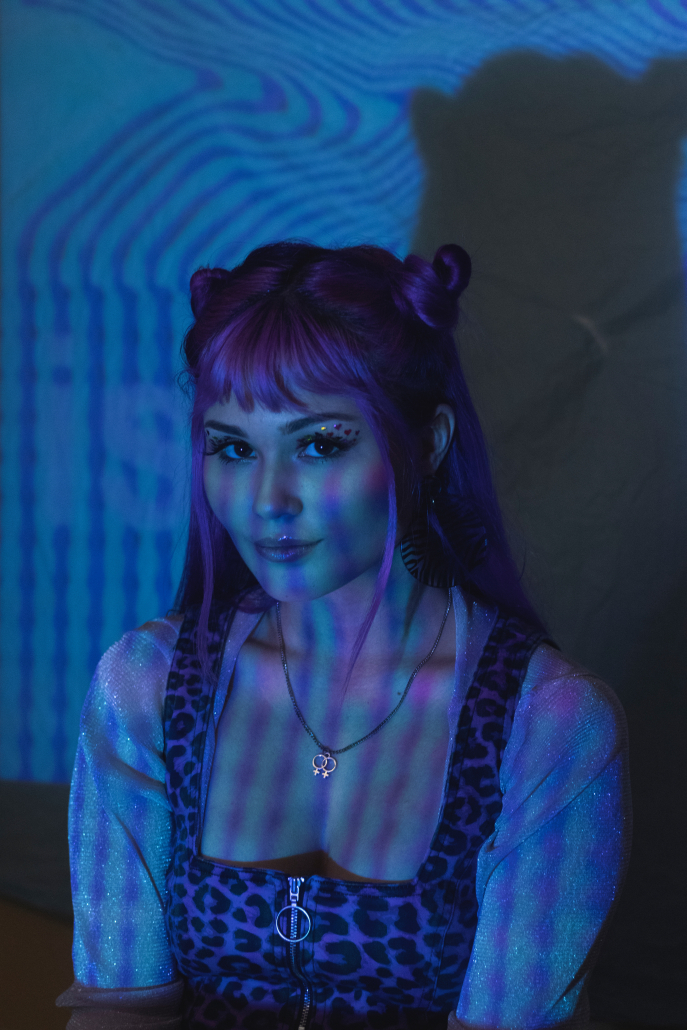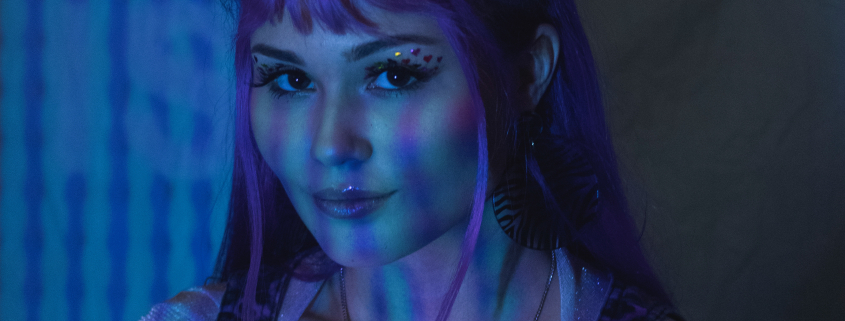Girl Online shines in digital spaces

Girl Online, the pseudonym for January Billington, a junior majoring in creative writing, doesn’t make music with a team of men backing them. They prefer their bedroom to the male-dominated classrooms of Thornton. And besides a small team consisting of their manager, a friend who masters their music and photographers or designers they collaborate with, they’ve entered the music industry alone.
Their friend and sophomore year roommate, Joyce Ni, describes Girl Online’s creative process as one that is completely solitary and filled with self-imposed intensity.
“Rooming with [them], I always saw that [they were] always hammering away at [their] laptop, making beats and producing sounds,” Ni said. “You can really tell that it’s [their] passion.”
For Girl Online, this stubborn independence is intentional. The 20-year-old artist revels in their solitary creative process. In an industry where production is largely dominated by men, Girl Online aims to make a space for femmes.
Their journey to music was a lonely one as well. Aside from a few piano lessons, they felt no push from family members to pursue their craft. Instead, afternoons in front of the Disney Channel inspired a young Girl Online to plunge into writing.
“The Disney pop girls…Selena Gomez, Hannah Montana, Demi Lovato. They were a huge influence on me,” Girl Online said. “They were my initial [sign that] I want to be a [singer-songwriter].
Girl Online’s roots in poetry and writing shine in their music and vice versa. They describe writing professors often urging them to turn a poem into a song, and still today, poetry is an avenue of expression for the artist.
At age 15, the Fresno native graduated to production. Recognizing the dearth of femmes in production, and inspired by artists like Grimes, SOPHIE and FKA Twigs, they concluded that maintaining their identity in the music industry requires having full control over the music they create. This commitment pushed Girl Online to start creating their own beats.
“It’s really important for me to be producing the music myself. At least, it’s important for me to [decide] 90% of what happens on it,” Girl Online said.
Their early writing and production manifested in their first EP, “Lonely Lover.” The project was entirely produced in GarageBand in their childhood bedroom. Since it dropped on SoundCloud, it’s garnered hundreds of thousands of streams. Despite the attention, Girl Online characterizes the EP as a meme now.
“I’m actually astounded that many people were vibing with what I had to say when I was 16,” Girl Online said. “My most streamed song ever is a cover that I hastily recorded after school, in my bedroom.”
While Girl Online’s older music was created for fun, and often hastily, their newer music is more purposeful. They sat on their latest single, “no man is ever gonna change u,” for seven months before releasing it in February.
“It’s okay to be confused / Just don’t believe you get to choose,” Girl Online cries over the song’s upbeat synths, chimes, spacey delays and natural trance-like sounds.
“I think [their] older music was just like ‘January is playing her music again.’ We would just laugh and dance and sing along,” Ni said. “[Their] new music? I actually was like, wow, the lyrics are really, really deep. I really felt [it] pulling on my heartstrings.”
The artist’s musical expansion is reflective of their personal growth. Towards the end of summer 2020, Girl Online found themself grappling with the biggest sexuality crisis of their life. They anxiously evaluated every experience they had with a man, trying to understand if what they previously thought was attraction was just conditioning. In desperation, they returned to their creative outlet. The result is a melodic ballad that provides a reassuring critique of compulsory heterosexuality.
“You don’t get to choose what your sexuality is. There’s not going to be a man that decides to change you. It just is what it is,” Girl Online said. “No matter if you are bi or a lesbian — that part of your identity — it’s something autonomous.”
Addressing LGBTQ+ causes and theory is what draws Girl Online to hyperpop. The genre is known for its maximalist approach to pop through the incorporation of unconventional sounds.
After moving to Los Angeles, Girl Online’s nightlife soon consisted of numerous HEAV3N parties. These rave-like functions were dominated by hyperpop and led by members of the LGBTQ+ community — a comforting experience for the artist. However, listening to the late SOPHIE’s “Ponyboy” solidified their interest in the genre.
“I think the one thing that draws so many gay people to hyperpop [is that] it’s just so freeing and fun. It’s that pure escapism,” Girl Online, who identifies as lesbian, said.
The electronic elements of hyperpop are often accompanied by references to internet culture and communities. In collaboration with other artists and designers, Girl Online creates cover art reminiscent of the internet of the earlier 2000s — the same one they grew up on and haven’t strayed far from.
The artist has amassed a following on Twitter, largely due to the support of other sapphic femmes. A quick swipe through their account reveals a witty, socially engaging Twitter persona. Solana Pallo Ross, a long-time supporter, is drawn to Girl Online because of the digital sapphic space they create in a world that doesn’t validate their love. The same queer-related themes and critiques of compulsory heterosexuality that manifest in Girl Online’s music appear in their tweets.
Many supporters, like Ross, who produces her own artistic work, also feel creatively affirmed by Girl Online’s celebration of sapphic love in their music and art. Girl Online’s supporters often learn about their music after stumbling across their page and recognizing them as a fellow creative and potential friend. This inspiring presence becomes even more important as creatives experience isolation and stagnation during the coronavirus pandemic.
Girl Online’s popularity on Twitter can largely be attributed to their humorous but gentle engagement with their followers. On a platform where users can resort to biting remarks during squabbles, the artist chooses to promote solidarity instead. They effortlessly encourage discourse relevant to marginalized communities, engaging supporters with empathy and a playful attitude.
“They’re always cracking jokes or making astute comedic observations, and oftentimes they go viral. But they’re also really kind,” Ross said. “Girl Online encourages a kinder and less vitriolic experience online.”
In many ways, Girl Online’s current experience on the internet, like many things, circles back to their childhood, and they don’t shy away from this fact. After experiencing a breakup in early 2020, the artist went through stages searching for their personal style. One period, which they endearingly describe as “human highlighter,” has largely faded away, aside from their bright purple hair. The result of this journey, however, is an amalgamation of Y2K, kawaii and cyberpunk elements. Their current fashion and beauty is largely reminiscent of the aesthetics that defined the popular culture arena of their childhood.
“Gen Z is like, we all grew up on the internet,” Girl Online said. “We all have these ancient Windows 95 memories of internet code in the back of our brains.”
Their unabashed exploration of their most childlike self is what lends authenticity to Girl Online’s voice. The creative identity they’ve built is backed by an ability to bare raw emotion and honesty, whether it be in their music, poetry or personal style. Their sonically upbeat production may not match their brooding lyrics, but the combination feels very right. Pulling from their deepest core values, identity and experiences, Girl Online creates a pixelated reality where cathartic release doesn’t entail wailing, whimpers or shed tears. Who needs men when you’ve got that?

